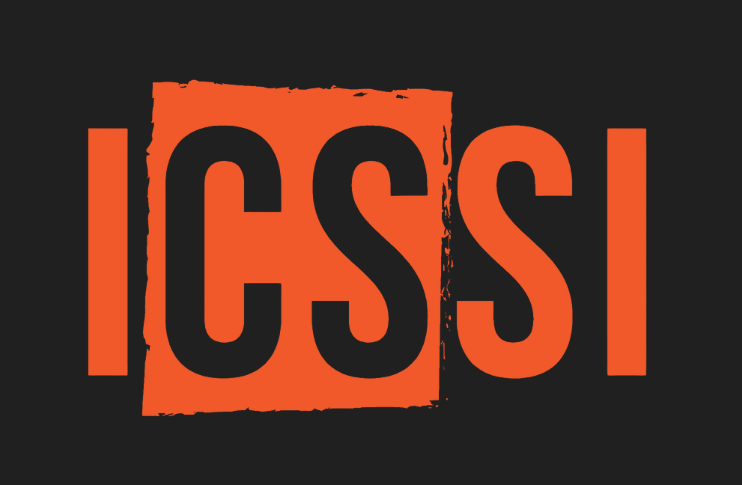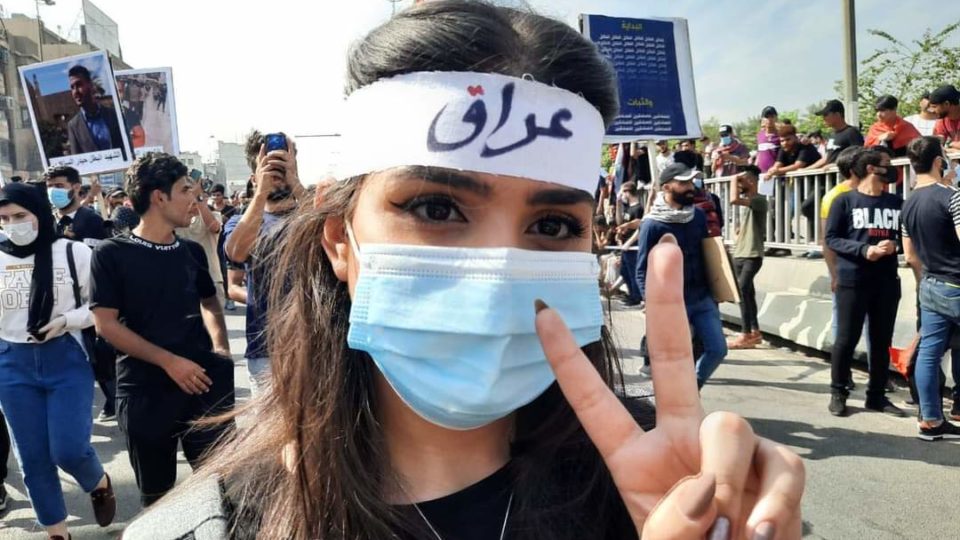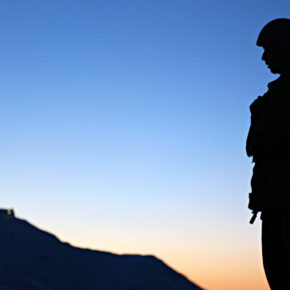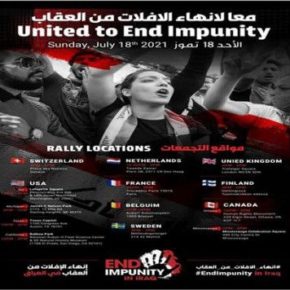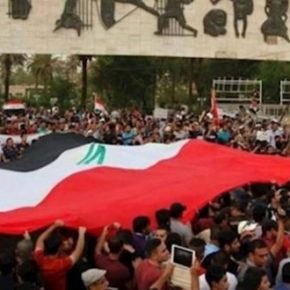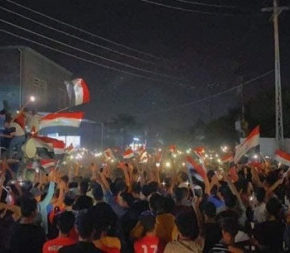Thousands of Protesters Return to Squares on the First Anniversary of the October Uprising
Yesterday in Baghdad, on the first anniversary of the October Uprising, thousands of young protesters gathered in the demonstration squares to commemorate the day. They were united in calling for recognition of the achievements of the past year and an assessment of the ability and commitment of the authorities to fulfill their promises to meet the demands of the protests that began on October 25, 2019 in Baghdad and the cities of central and southern Iraq.
In contrast to the 2019 protests, which were mobilized on social media via the Arabic hashtag “We want a homeland”, this time the protests are largely using scheduled and secretive hashtags in order to prevent infiltration by militias seeking to destroy the protest movement. Many of the protesters’ demands remain the same: basic services, job creation, an end to foreign interference and corruption. It is not possible to predict with certainty the magnitude of mass turnout this year due to the Coronavirus pandemic and to the impacts of the violence against protesters. More than seven hundred protesters were killed and thousands were injured. Dozens more, who were presumably kidnapped, remain missing.
This time around, there is a moral responsibility and commitment linking those who are organizing the demonstrations in various cities. Organizers are building on their experiences from last year to mobilize a new round of protests by coordinating with Iraqi security forces and presenting more clearly defined political demands. These include finalizing the new election law, holding early elections, full implementation of the political parties’ law to prevent the involvement of militias in the political process, public disclosure of politicians’ sources of funding, combating corruption and exposing those involved, accountability for killing and injuring the demonstrators, imposing a state monopoly over weapons, and ending the targeting of activists by masked attackers.
Last year’s protests led to many changes on the Iraqi political and social scene. After less than a month of protest, former Prime Minister Adel Abdul-Mahdi and his government were forced to resign. Next the politicians put forward two successive candidates for the position of Prime Minister, Mr. Muhammad Tawfiq Allawi and Mr. Adnan Al-Zorfi, but the consensus on the street in opposition to these men prevented the approval of either one. The protesting masses, seeing that the politicians were not willing to reform, fiercely debated the ability of the political class to select a candidate who would address the goals and aspirations of the increasingly infuriated and frustrated protesters. Then at the end of February, the first cases of Coronavirus appeared in Iraq. At the same time, Mr. Mustafa Al- Kadhimi was approved to head a new government, which was formed just as preventive measures to halt the Covid-19 pandemic were being instituted. The economic crisis that resulted from the lockdowns, which coincided with huge decreases in oil prices, caused a financial crisis for the government. It was unable to pay the salaries of government employees and was forced to resort to external borrowing. Many people suffered as the country’s economic situation deepened.
Meeting one of the protesters’ main demands, Prime Minister al-Kadhimi announced, on July 31, that Iraq would hold early elections on June 6, 2021. Parliament, however, has not yet finalized a new electoral law due to disagreements over issues such as the number of seats for constituencies. Kadhimi has also repeatedly vowed to hold perpetrators of violence against the protestors accountable, but there are so far no tangible results. On the contrary, kidnappings and assassinations of activists have only escalated of late. On August 19, in one of the foremost cases, the activist Reham Yacoub was murdered in the southern city of Basra. This raised doubts about the prime minister’s seriousness, or ability, to pursue justice. Instead, Kadhimi has attempted to appease protesters by offering prominent figures in the movement jobs in his cabinet, employing activists on the defense payroll, and promising compensation to martyrs’ families. However, the economic crisis caused by low oil prices and COVID-19 has limited Kadhimi’s ability to buy off and placate the protesters in this traditional fashion.
The spontaneous nature of the October 2019 protests meant that the protesters lacked an organized framework, which in turn often gave political parties an upper hand in influencing the protest movement. Having seen how this unfolded, prominent activists in the movement have announced their intentions to demonstrate peacefully on October 25 and begin to establish new political parties in an effort to enter the electoral process. They have also announced an initiative to conduct a public awareness campaign to encourage citizens to participate in the upcoming elections in order to build their own political constituency.
Concerning the authorities’ most recent handling of the protests, demonstrators have described quite different experiences of the actions the security forces since the Al-Kadhimi government replaced that of Adel Abdul Mahdi. There are some initial indications that the security forces’ hostility towards the protests has diminished and they are less repressive. There may even be significant cooperation between the security forces and the protesters out of concers that any escalation in violence will cause Al-Kadhimi’s supporters to lose confidence in him.
Still a renewed cycle of violence remains one of the major concerns of the protesters. Last year’s demonstrations in the capital and the southern governorates witnessed various levels of violence. Casualties at demonstration sites occurred in eleven provinces in southern and central Iraq. The use of unnecessary and excessive force—including live ammunition and military grade tear gas—was common in several governorates, especially Baghdad, Dhi Qar, Karbala and Basra.
As protests resume and the call for reforms is renewed, the mass mobilization may again see incidents of violence. Iraqi protesters and activists must be wary of spoilers who may frustrate or hijack the demonstrations in an effort to influence events in their favor. The path to change requires patience and a commitment to peace and nonviolence. The government may be able to help control the situation if it commits to protecting the protesters, maintaining peace, and taking bold steps to restrain those involved in inciting violence for any reason. The authorities’ priority should be to ensure the demonstrators’ right to peaceful assembly and protest, and to protect their lives; the methods of repression that were previously adopted have no place in a free society.
